Civil Liberties, Criminalizing Dissent, FBI Intrusion, Habeas Corpus, Human Rights, Political Prisoner, Prison Industry, Supreme Court, Surveillance, Torture
Podcast: Play in new window | Download
Updates:
—-
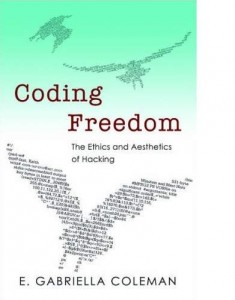

Coding Freedom: The Ethics and Aesthetics of Hacking
In the past 2 years, we’ve discussed in many interviews and updates, the attacks on whistle-blowers and hackers. The emerging movement of programmers, hackers, open source software, online communities has challenged and exposed corporate and government control and surveillance, making them targets of prosecution. As many may know, our own Michael Ratner has represented whistle-blower Julian Assange, computer activist Jeremy Hammond, and has been a legal adviser to many others including the late Aaron Swartz. Today we talk with author Gabriella Coleman about her recently published book Encoding Freedom: The Ethics and Aesthetics of Hacking. It’s a good place to start for those learning about the political significance of free software, intellectual property and the morality of computer hacking.
Gabriella Coleman:
- When you utter the word hacker, usually the image that pops into people’s minds is nefarious criminal. That can be the case but really hackers are composed of an extremely lively group of individuals who tend to be computer programmers and network administrators, who actually are committed to a range of civil liberties such as free speech and privacy. Especially in the last decade they’ve been involved in political activities as well.
- They’re quite a bit of diversity among hackers, technically.
- Hackers – are keenly aware of the issues such as censorship, which impact the present and the future of the internet. Some hackers are committed to insuring internet freedoms for their own productive autonomy.
- Beyond productive autonomy they’re really starting to care about the broader issues relating to internet freedoms and how they relate to democracy at large.
- In order for software to be made, it must be written in a programming language such as C++, Python and Pearl and its written in source code. These are the underlying directions of software.
- A very prominent group of hackers who are committed to always having access to source code have actually reinvented the law to make sure that that source code is eternally available. They’re very much against copyrights and patents and have created something called a copyleft to make sure the source code that powers software is always accessible to them.
- Proprietary software such as the Microsoft Operating System is behind lock and key. We don’t have access to the underlying directions.
- There’s a contingent within the hacker world who believe that access is not only good for the sake of improving technology but is the morally right thing to do.
- That its a collaborative process, that everyone should have access to it. There are other hackers that are a little less concerned about the ethics of access and they’re more concerned about the pragmatics.
- I originally thought that these free software developers who were part of these large projects such as Debion, were raging Leftists. The project itself had collected people from all political orientations.
- Anonymous is a digital phenomena somewhat composed of hackers but not exclusively so, who has engaged in an enormous amount of political activities. They are innovating in the realm of direct action related to digital protest.
- Some will engage in hacking to get information about corporate corruption to leak to the world at large. They also engage in distributed denial of service attacks where a website is so overloaded with requests it comes off line.
- Free software, in order for it to be free speech is also like free beer, you have to make the source code available. But that doesn’t stop people from charging money for support or services.
- In the case of SOPA being passed, there was massive outcry, and massive organization to do something about it to stop it in its tracks. It came from different quarters of society, it came from corporate giants such as google, it came from the Electronic Frontier Foundation, and there was a huge black out where people took down their websites. It had a massive effect and stopped it in its tracks.
- I’m currently working on a book on Anonymous. That should be definitely done by 2013.
Guest – Gabriella Coleman, Wolfe Chair in Scientific and Technological Literacy in the Art History and Communication Studies Department at McGill University. Trained as an anthropologist, she researches, writes, and teaches on hackers and digital activism. Her first book on Free Software, “Coding Freedom: The Aesthetics and the Ethics of Hacking” has been published with Princeton University Press. It is available for purchase and you can download a copy on here.
—-
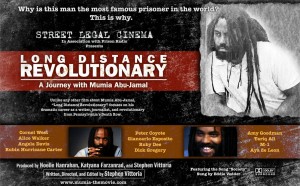
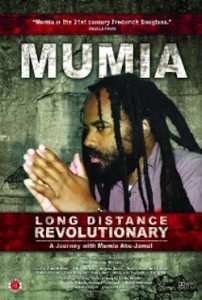
Long Distance Revolutionary: A Journey with Mumia Abu-Jamal
The new documentary, “Long Distance Revolutionary: A Journey with Mumia Abu-Jamal,” is premiering across the country. The film includes interviews from Cornel West, Alice Walker, Ruby Dee, Dick Gregory, Amy Goodman, Michael Parenti, writers Tariq Ali, and Michelle Alexander. This film beautifully captures the importance of Mumia Abu-Jamal’s life as an American journalist, and radical. He published seven books in prison including the best selling “Live From Death Row.”
In Chris Hedges’ review he points out what Cornel West says in the film: “The state is very clever in terms of keeping track, especially [of] the courageous and visionary ones, the ones that are long-distance runners. You can keep track of them, absorb ’em, dilute ’em, or outright kill ’em—you don’t have to worry about opposition to ’em.”
Steve Vittoria:
- The arc of Mumia’s life and the body of his work which is remarkable under harsh and draconian conditions is much more than December 9, 1981. I’ve always seen his life as more than one moment.
- I wanted to tap into what I found was clearly a unique story. Here’s a young man who early on realized he was a revolutionary by the time he was 15 years old.
- He’s writing remarkable work for the Black Panther Party and their newspaper. By 26, he’s a vibrant radio broadcaster and journalist in Philadelphia, reaches NPR and All Things Considered.
- After incarceration, he publishes 7 or 8 books.
- I did from a creative standpoint and a very practical standpoint.
- I wanted to tell a really good story. Any filmmaker, that’s job number one. Mumia, you just have to turn the camera on and you can tell a great story.
- If the film starts to win awards and get fawned over then something’s wrong.
- My favorite interview in the film is Mumia’s sister Lydia Barashango who unfortunately passed away a few months after we interviewed her from her bout with cancer. She went to great lengths to secure her baby brother’s legacy.
- Trying to find what it was like as a young African-American kid growing up in one of the great racist northern cities of Philadelphia, what it was like
- I didn’t realize how funny he could be. He’s kind of a science fiction nerd. He calls himself a nerd.
- Mumia has a very strict schedule for work.
Guest – Steve Vittoria, the writer, director, producer and editor of Long Distance Revolutionary: A Journey with Mumia Abu-Jamal. The film premiered in theaters in New York City earlier this month.
—————————————
CIA Sponsored Terror, Civil Liberties, Criminalizing Dissent, FBI Intrusion, Green Scare, Habeas Corpus, Human Rights, Political Prisoner, Prison Industry, Supreme Court, Targeting Muslims, Truth to Power
Podcast: Play in new window | Download
Updates:
- Chile: 40 Years Later Eight Former Army Lieutenants Charged in the Killing of Communist Performer/Songwriter Victor Jara.
- Heidi Boghosian and Johanna Fernandez Visit Mumia Abu-Jamal During Holidays
- Death Penalty States In The United States Update
- Jeremy Hammond’s Judge Refuses To Recuse Herself : Contrary to what has been reported on Democracy Now and Law and Disorder, a motion has been filed (not ruled) for the judge to recuse herself.
——-
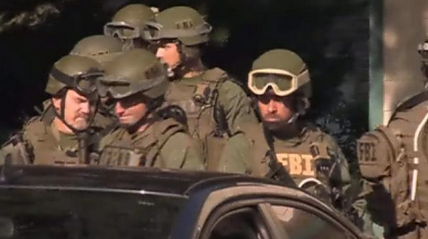

FBI Considers The Occupy Movement A Terrorist Threat: The State of Civil Rights and Public Policy
A few weeks ago the Partnership for Civil Justice Fund released secret documents obtained by Freedom of Information Act requests revealing that the Occupy movement was treated as a terrorist threat by the FBI. This is despite agency acknowledgement that the organizers called for peaceful protests. The documents also show massive resources used to track the Occupy movement, a month prior to the encampment in Zuccotti Park. FBI and counter-terrorism agents in offices across the country, from Anchorage to Jacksonville, to Tampa, Virginia, Milwaukee, Birmingham, Memphis and Denver, coordinated with various local and federal law enforcement, to monitor and collect intelligence on OWS. The documents obtained by the PCJF are heavily redacted and the tip of the ice berg says our guest attorney Mara Verheyden Hilliard. We also talk with Mara about her thoughts on the state of civil rights for the year moving forward.
Attorney Mara Verheyden-Hilliard:
- The Partnership For Civil Justice Fund filed a series of Freedom of Information Act requests with federal agencies, as well as with municipalities and police departments around the country.
- Prior to the FBI materials we have obtained a lot of documents showing the Department of Homeland Security’s involvement as well as local police involvement around the country.
- It doesn’t come as a shock to people that the FBI has continued unabated its historic role as the secret police in the United States, acting against the social justice movement in the US.
- The documents also show us this deep and close partnership the FBI and DHS have with Wall Street, and with the banks and businesses in the United States.
- The documents show the U.S. intelligence agencies and supposedly security agencies really working as the private intelligence arm for private businesses.
- You have the people in the United States rising up in opposition to an economic devastation caused by the banks and by Wall Street and the U.S. government acting in partnership with the banks and Wall Street against those people.
- These documents show for example the FBI was communicating with the New York Stock Exchange in August of 2011, a month before the first tent was set up in Zucotti Park.
- One of the documents we have involves the Domestic Security Alliance Council, where they’re planning on the West Coast port actions of the Occupy movement.
- The DSAC is a government agency that describes itself as a partnership between the FBI, DHS and the private sector. The Lower Manhattan Security Initiative.
- It shows that we’re not looking at something anomalous and aberrational, its pulling back the cloak on what the U.S. government, its intelligence agencies and its “terrorism” authorities is really doing and who its partnering with. It’s against the people of the United States and not for the people of the United States.
- Those people and that movement is then treated by the government as a potential criminal or terrorist threat.
- It helps understand when the government uses the terms of terrorism so broadly and how it uses the authority and the money that it takes from the people of the United States.
- If the FBI had materials that showed criminal activity, they would’ve been delighted to produce some and make those public. That’s not an uncommon action by the FBI given its routine willingness over the years to set people up and announce a big terrorism arrest.
- The sniper reference is a reference in Houston.
- I think it bares pointing out that this FBI, is President Obama’s FBI.
- When the feel the power of the people in the streets, the U.S. intelligence agencies and the local law enforcement agencies go into high gear, because it really is the movement of the people that does cause change.
- At times when it peaks like this, you can really see the truth of their operation.
- It is illegal to use administrative raids for other pretexts.
- We’re appealing both redactions as well as scope of production and scope of search.
Guest – Mara Verheyden-Hilliard, co-chair of the Guild’s national Mass Defense Committee. Co-founder of the Partnership for Civil Justice Fund in Washington, DC, she recently secured $13.7 million for about 700 of the 2000 IMF/World Bank protesters in Becker, et al. v. District of Columbia, et al., while also winning pledges from the District to improve police training about First Amendment issues. She won $8.25 million for approximately 400 class members in Barham, et al. v. Ramsey, et al. (alleging false arrest at the 2002 IMF/World Bank protests). She served as lead counsel in Mills, et al v. District of Columbia (obtaining a ruling that D.C.’s seizure and interrogation police checkpoint program was unconstitutional); in Bolger, et al. v. District of Columbia (involving targeting of political activists and false arrest by law enforcement based on political affiliation); and in National Council of Arab Americans, et al. v. City of New York, et al. (successfully challenging the city’s efforts to discriminatorily restrict mass assembly in Central Park’s Great Lawn stemming from the 2004 RNC protests.)
———
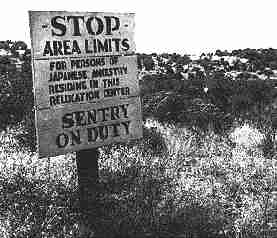
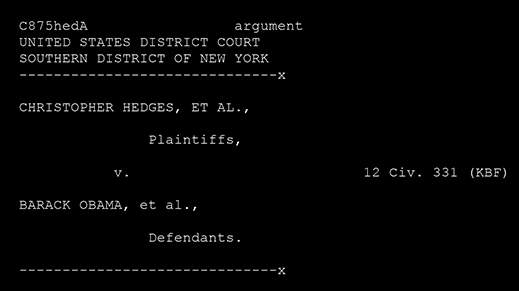
Challenging The National Defense Authorization Act of 2012
Last September a federal judge struck down part of the National Defense Authorization Act signed by President Obama that gave the government power to indefinitely detain anyone, anywhere in the world it considers to substantially support or be in associative force with terrorism. This includes US citizens. Judge Katherine Forrest of the Southern District of New York had ruled the indefinite detention provision of the National Defense Authorization Act likely violates the First and Fifth Amendments of U.S. citizens.
Attorney Carl Mayer:
- Some people call it (NDAA) the Homeland Battlefield Act because it treats the United States as a battlefield and allows the military to exercise power over civilians which is antithetical to our democracy and to our 200 years of Constitutional precedence.
- In May of 2012, we after a trial before Katherine Forrest who’s a federal judge in the Southern District of New York we achieved a preliminary injunction. That was then appealed but the appeal would stay pending a trial on a permanent injunction and on September 12, 2012, Judge Forrest issued a permanent injunction against the NDAA.
- The NDAA was stopped between May 16, 2012 and December 12, 2012.
- However, once that happened, the Obama Administration went into overdrive and immediately appealed that to the Second Circuit and asked for a stay of Judge Forrest’s order pending appeal.
- That stay lifted Judge Forrest’s injunction unfortunately the NDAA of 2012 now operates.
- In their papers, the government promised our clients would not be touched under the NDAA and they seemed to imply that no one in their (clients) position would be touched under the NDAA.
- StopNDAA.org
- People can go there and read Judge Forrester’s 112 page opinion and all the documents from the case.
- What’s at stake is the liberty and the right to free speech of all journalists and all activists and indeed any citizen of the United States of America.
- Because the military has never had the power to detain civilians.
- The only exception to that was during World War 2 when Japanese-Americans were interred in prison camps.
- There’s not right to a trial by jury, there’s no right to an attorney. This an authoritarian measure.
- I would venture to guess your hosts and co-hosts are on a list somewhere.
- Chris Hedges for example was a correspondent for several years that covered not only al-Qaeda but 17 other groups that are one the State Department Terrorism List
- He testified that he had a reasonable fear that the NDAA could put him in jeopardy.
- You know as attorneys what’s incredible about this law is there’s no definitional section.
- It doesn’t define what associated forces are. It doesn’t define what substantially supportive means.
- Chris Hedges was detained by the military for leaving the press pool in Iraq.
- Now the NDAA allows these detentions “until the end of hostilities.”
- It really is a heinous statute.
- We lost the stay but we got an expedited appeal.
- The briefing is complete and we’re waiting for an oral argument date.
- The government has two moves, they say whoever brings the suit has no standing, then if it gets past that point they say, sorry the state’s secrets doesn’t allow you to have discovery here.
- Attorney General Holder stated that Americans are entitled to due process but that doesn’t necessarily means judicial process.
- It takes the view that “during war time” that the judiciary has no role to play.
- The NDAA is the culmination of 10 years of anti-civil liberties measures.
Guest – Attorney Carl Mayer runs the Mayer Law Group LLC and is the author of several books including “Shakedown” and “Public Domain, Private Dominion.” Carl Mayer is a former law professor and served as special counsel to the New York State Attorney General.
——————————————————————————
CIA Sponsored Terror, Civil Liberties, Criminalizing Dissent, FBI Intrusion, Green Scare, Habeas Corpus, Human Rights, Political Prisoner, RFID, Supreme Court, Surveillance, Targeting Muslims, Torture, Truth to Power, War Resister
Podcast: Play in new window | Download
Updates:
- Khaled El-Masri and the European Court of Human Rights Decision
- European Court of Human Rights Labels CIA Interrogation Procedures as “Torture”
—–
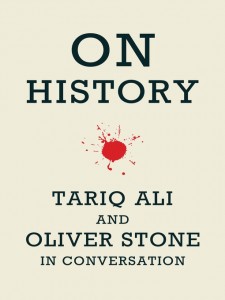
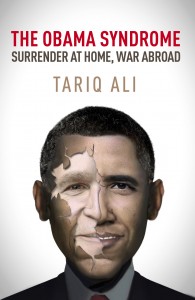
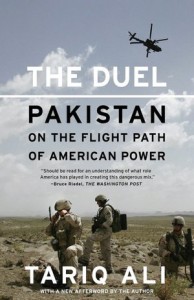
Tariq Ali: Turning Points in the History of Imperialism
Today we’re joined by internationally renowned writer and activist Tariq Ali. Tariq is visiting from London where he is editor of the New Left Review.
A writer and filmmaker, Tariq has written more than 2 dozen books on world history and politics, including The Duel: Pakistan on the Flight Path of American Power, The Obama Syndrome and On History. We talk specifically about several turning points in global history, the Occupy movement and US elections. .
Tariq Ali:
- The think the first World War was crucial but it wasn’t the war itself it was the consequences of that war. Here you had huge empires.
- The Russian revolution challenged capitalism frontally and its leaders said we want Europe to be with us, on our own we can’t do it. We need the Germans, we need a German revolution. That frightened the capitalist class globally.
- Woodrow Wilson, decided that the time had come to intervene. 22 countries came to intervene.
- This intervention made it impossible for the early infant Soviet Union to achieve what it wanted to achieve.
- The Second World War was an effort by the German ruling class to get its share of the world market in countries.
- The US helped rebuild Japan and Germany. They helped build France and Britain by the Marshal Plan and that has never been done by a big imperial power before.
- They managed to get the Soviet Union to implode by having an arms race. The Russians fell into their trap and decided to go for the arms race, had they not history might have been different.
- I hope the Chinese do not fall into the same trap, threatened by Obama’s puny little bases in Australia.
- People, early settlers in the United States got land totally free and they took it and that created the belief in the American psyche of private property.
- The Soviet Union imploded because the people lost faith in the system.
- The entire elite in the United States and Western Europe is wedded to the Washington consensus that emerged after the collapse of communism. The center piece of this consensus was a system which believed in market forces. I refer to it as market fundamentalism.
- We are confronting the extremism of the center and the result of this is no alternatives exist within mainstream politics. The effect that this is having is hollowing out democracy itself.
- Occupy: What we need is for these movements to call an assembly nationally and discuss a charter of demands for progressive America which need only be ten demands but something around which people can rally. I think its a movement that should be created bearing what the needs of ordinary people are.
- In order to understand the laws of motion of capital, you have to read Marx. It’s true capitalism has become much much more complex. Zombie capitalism, or fictitious capitalism, where money is used to make more money.
- It’s not money that’s creating productive goods.
- I had written a book on South American because I got very engaged in the Venezuela-Boliverian struggle and got to know Chavez very well.
- If Americans had access to Cuban medicine, the pharmaceutical companies would collapse, they would never let it happen.
Guest – Tariq Ali, writer, journalist and film-maker, born in Lahore and educated at Oxford University. He writes regularly for a range of publications including The Guardian and The London Review of Books. He has written more than a dozen books including non-fiction as well as scripts for both stage and screen.
—–
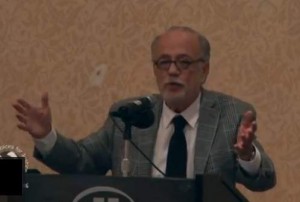
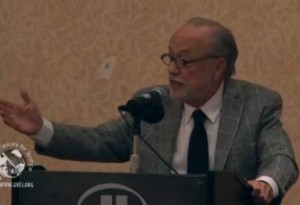
National Lawyers Guild 75 Years
Hundreds of National Lawyers Guild members and allies gathered to celebrate the organization’s 75th anniversary at the Law for the People convention in Pasadena, California. We hear excerpts from speeches from the National Lawyers Guild Convention by Attorney Jim Lafferty The 2012 Law for the People Award was given to Jim Lafferty.
Scholar and activist Angela Davis delivered the keynote address and among the convention honorees will be Margaret Burnham, a professor of civil rights law who, as a young lawyer, helped secure Davis’s 1972 acquittal on high-profile charges.
Founded in 1937, the National Lawyers Guild is the oldest and largest public interest/human rights bar association in the United States. Its headquarters are in New York City and it has members in every state.
Jim Lafferty, Executive director of the National Lawyers Guild in Los Angeles and host of The Lawyers Guild Show on Pacifica’s KPFK 90. 7 FM.
——————————————————————-
Afghanistan War, CIA Sponsored Terror, Civil Liberties, Criminalizing Dissent, Extraordinary Rendition, FBI Intrusion, Guantanamo, Habeas Corpus, Human Rights, Political Prisoner, Prison Industry, Prosecution of the Bush Administration, Supreme Court, Targeting Muslims, Torture
Podcast: Play in new window | Download
Updates:
——
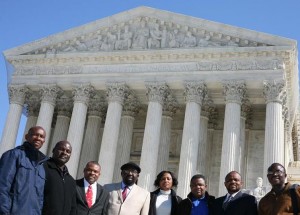
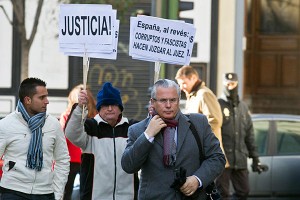
Universal Jurisdiction: Kiobel v. Royal Dutch Shell / Bush 6 Case In Spain
This week the US Supreme Court will decide if corporations could be held liable in U.S. courts for violations of international human rights law in the land mark case Kiobel v. Royal Dutch Petroleum. The case was brought by families of seven Nigerians who were executed by a former military government for protesting Shell’s exploration and development and is pushing to hold corporations accountable for human rights violations. The Supreme Court will also consider how the Alien Tort Statute Claim can be used the Kiobel case. A one sentence law that goes back to 1789 when the first judiciary act was brought in the United States. We’ve discussed this statute with several past guests including attorneys Peter Weiss and Rhonda Copeland who were instrumental in beginning the first cases in which human rights violations, taking place in other countries could actually be litigated in the United States.
We also discuss the recent amicus filing by a group of international human rights organizations and experts before the Spanish Supreme Court. The brief asks the Spanish Supreme Court to overturn a decision not to pursue a criminal case against six former officials from the Bush administration for their role in directing and implementing a systematic torture program. Past shows with Katherine Gallagher.
Attorney Katherine Gallagher:
- The Kiobel case has been in US courts since 2004.
- The claims were brought in the Southern District of New York, under a law from 1789, known as the Alien Tort Statute.
- This law allows non-US citizens to come into a US federal court and assert violations of the Laws of Nations or International Law.
- A recent precedence for this is Citizens United, what happened was that the Second Circuit ruled that corporations could not be held liable for these egregious human rights violations under the Alien Tort Statute.
- The question of corporate liability went up to the Supreme Court first.
- We had 2 judges from a 3 bunch panel in the Second Circuit suddenly come out in the fall of 2009 and say there is no corporate liability. That is the question that went up to the Supreme Court.
- Four other circuits had look at this question and they said of course corporations can be held as liable as an individual, a natural person.
- The Alien Tort Statute allows for a civil suit and civil liability rather than criminal liability.
- The key case from 1980 that CCR brought, the case of Filartiga, this case which the Supreme Court affirmed in 2004 as being on solid legal basis, claims by a Paraguayan, against a Paraguayan for actions that occurred in Paraguay.
- So its very strange that the Supreme Court was asking in a very broad fashion whether the ATS could apply to actions that occurred in another country. That is what the bulk of the cases brought under the ATS have been about.
- Some of the cases where the ATS is used are for some of the most serious violations. Cases of war crimes, crimes against humanity, torture, not your run of the mill case.
- What the justices seem to coalesce around was the issue of whether there’s an alternate forum. If the claims against Shell could have been brought in the UK or in the Netherlands, maybe they don’t need to be brought in the US.
- We’ve seen a trend in the last 20 years of other countries adopting stronger laws that allow for redress, and accountability, so we don’t have to be the world’s policeman.
- There have been 2 cases that percolated up in the last 4 years in Spain.
- The first is a widespread investigation of the torture program then Judge Balthazar Garzon. This is a case looking at torture in Guantanamo, and potentially in Iraq and Afghanistan, looking at the whole U.S. torture program. That case was brought on by 4 named plaintiffs.
- That case is very wide ranging, and willing to go up the chain of command as far as the evidence leads.
- There is a second case that was brought against specific U.S. individuals. They’re known as the Bush 6, including, Jay Bybee, John Yu, David Addington, Alberto Gonzalez. Six men who served as lawyers and argued to have essentially created both the legal structure that enabled the torture program, providing arguements for immunity and protecting participants of the torture program from accountability.
- Spain has a long and proud history of upholding International Law. Spain is where we had the case against Augusto Pinochet in the late 90s.
- We’ll be doing this as long as we need. We need to have accountability, its really critical.
Guest – Katherine Gallagher, Senior Staff Attorney at the Center for Constitutional Rights (CCR), where she focuses on holding individuals, including US and foreign government officials, and corporations, including private military contractors, accountable for serious human rights violations. Among the cases she has worked, or is working, on are international accountability efforts for U.S. officials involved in torture (Spain, Switzerland, Canada); ICC Vatican Officials Prosecution; Arar v. Ashcroft, Corrie v. Caterpillar, Matar v. Dichter, Saleh v. Titan, Al-Quraishi v. Nakhla and L-3, Estate of Atban v. Blackwater.
—————————————————————————————————
Civil Liberties, Criminalizing Dissent, FBI Intrusion, Habeas Corpus, Human Rights, Military Tribunal, Political Prisoner, Supreme Court, Torture, War Resister
Podcast: Play in new window | Download
Updates:
- Bradley Manning Public Access Case: Amicus Brief Filed by Reporters’ Committee for Freedom of the Press
- Southern Poverty Law Center Lawsuit Against Chemically Spraying Students
———
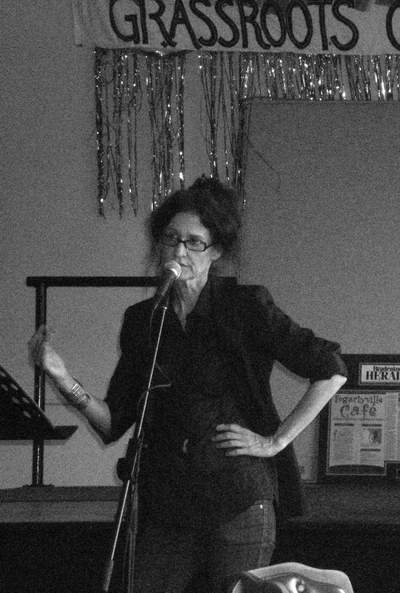
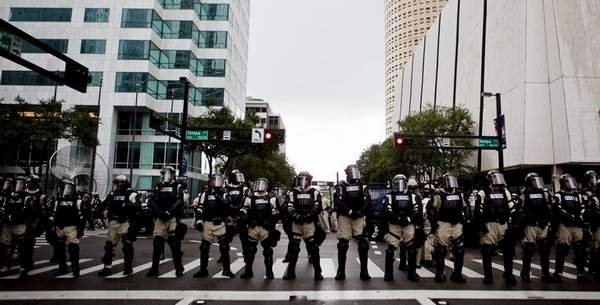
Attorney Heidi Boghosian Speech: National Special Security Events – RNC / DNC
We hear a presentation by our own Heidi Boghosian. Heidi spoke at an event sponsored by station affiliate WSLR FM 96.5 – Sarasota, Florida. As the executive director of the National Lawyers Guild, Heidi had coordinated and organized legal observers during the Republican National Convention in Tampa and the Democratic National Convention in Charlotte. While in Florida, Heidi delivered a talk about the eroding civil rights of protesters during National Special Security events, pre-event surveillance and tactical strategies deployed by police.
Heidi Boghosian is the executive director of the National Lawyers Guild, a progressive bar association established in 1937. She has published articles on policing, protest and the First Amendment including Punishing Protest and The Assault on Free Speech, Public Assembly, and Dissent (North River Press, 2004). Her book reviews have been published in The Federal Lawyer magazine and the New York Law Journal.
———
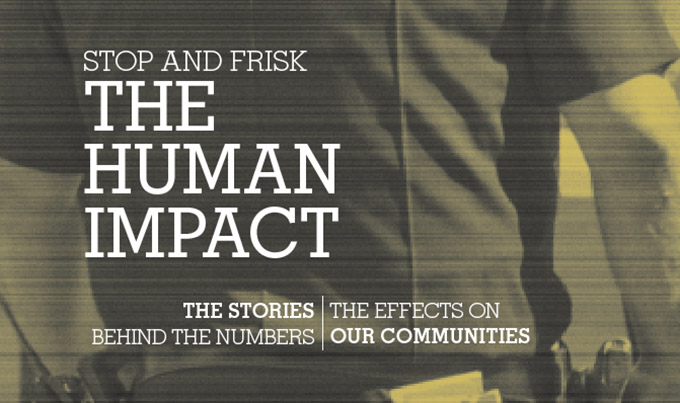
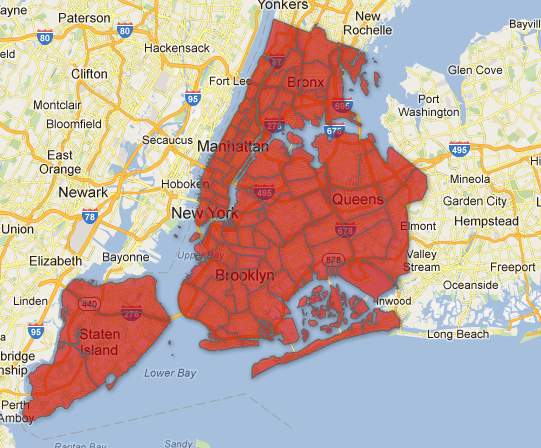
CCR Stop and Frisk Suit NYC: Floyd et al. v. New York City
Last month, a federal judge excluded portions of proposed testimony from New York City’s key witness in the Center for Constitutional Right’s Stop and Frisk class action lawsuit Floyd v. City of New York. Judge Shira A. Scheindlin of the U.S. District Court for the Southern District of New York ruled the defendants’ testimony untested and unreliable. The ruling supports that there isn’t evidence that the “Stop and Frisk” practice reduces crime.” said CCR Legal Director Vince Warren (quote) “The ruling soundly rejects the false choice propounded by the NYPD, between living in a safe city and being free of unconstitutional, racially discriminatory policing.”
In 2009 New York City, a record 576,394 people were stopped, 84 percent of whom were Black and Latino residents — although they comprise only about 26 percent and 27 percent of New York City’s total population respectively. Ten years of raw data obtained by court order from the New York City Police Department (NYPD) showed that stop-and-frisks result in a minimal yield of weapons and contraband.
Attorney Darius Charney:
- When we say “stop” were really talking about a detention of somebody’s liberty by the police. Frisk is a pat down of the outside of somebody’s clothing.
- For purposes of the 4th Amendment we are talking about a seizure when somebody is stopped, their liberty is taken away from them for a period of time and when they’re frisked, they’re searched.
- About 99.3 percent of the time the police find no gun.
- According the Supreme Court in a case they decided about 44 years ago, called Terry v. Ohio, for a police officer to stop someone on the street they have to have what’s called reasonable, articulatable suspicion.
- It has to be more than a hunch, or a whim or a subjective belief that somebody’s doing something wrong. It has to be articulatable specific facts that the officer is aware of that would cause him or her to reasonably believe that this person has committed a crime, is in the process of committing a crime or is about to commit a crime.
- If they have reasonable suspicion and they stop to ask you questions, you’re supposed to answer the questions.
- They may ask you for identification, that’s not against the law in New York state. You don’t have to provide it to them.
- You’re free to not answer but depending on what the questions are and if you don’t answer them, that may give the officer a basis to have probable cause to arrest you.
- For the officer to then put their hands on you, they have to have reasonable suspicion that you’re armed and dangerous.
- It can’t be that they think you have drugs in your pocket. Officers often get angry or irritated if you assert the rights that you have.
- What commonly happens in New York and other places is that somebody does assert their rights the officer may retaliate against them by issuing them a ticket for disorderly conduct.
- The person has a right to say “show me your badge” to a plain clothes police officer.
- Stop and Frisk has increased over 600 percent in New York City.
- In New York police are arresting 50 thousand people a year with small amounts of marijuana.
- The New York Police Department Stop and Frisk practices are literally going to be put on trial in a federal court in Manhattan this coming Spring.
- We were certified for a class action in May, so we have a website for class members. Stopandfrisk
- In order to fight crime you need to work together with the community and if the community doesn’t trust you, fear you, that’s not going to happen.
Guest – Attorney Darius Charney, senior staff attorney in the Racial Justice/Government Misconduct Docket. He is currently lead counsel on Floyd v. City of New York, a federal civil rights class action lawsuit challenging the New York Police Department’s unconstitutional and racially discriminatory stop-and-frisk practices, and Vulcan Society Inc. v. the City of New York, a Title VII class action lawsuit on behalf of African-American applicants to the New York City Fire Department which challenges the racially discriminatory hiring practices of the FDNY.
—————————-
CIA Sponsored Terror, Civil Liberties, Habeas Corpus, Human Rights, Iraq War, Military Tribunal, Prison Industry, Supreme Court, Torture
Podcast: Play in new window | Download
Updates:
- Michael Ratner: Update on Julian Assange
—-
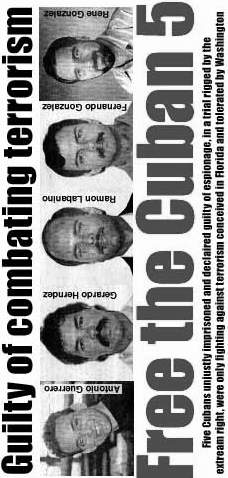
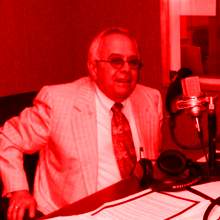
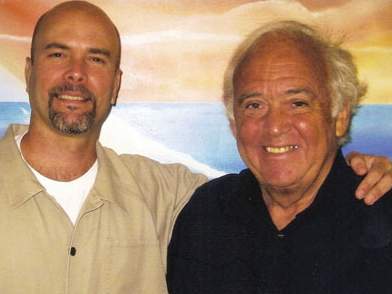
Attorney Martin Garbus and the Cuban Five
Earlier this summer we talked with renowned First Amendment and civil rights attorney Martin Garbus about joining the Cuban Five’s legal defense team. He recently filed an affidavit in the Miami Federal District Court based on US government misconduct of paying Miami journalists during the Cuban Five’s prosecution 14 years ago. As many listeners may know, these paid reporters covered the Cuban Five case in an almost hysterical fashion. The affidavit supports Cuban Five defendant Gerardo Hernández’ habeas corpus appeal and seeks the overturning of his wrongful conviction.
Attorney Martin Garbus:
- We’re saying that every person involved in the payments, the government, Radio Marti, the persons who received the payments. The journalists also violated the law.
- I think it is jury tampering. We’re saying that every dollar that was paid is a violation of the integrity of a jury trial. There were many millions of dollars.
- We’re saying that the jury trial was destroyed by a propaganda machine.
- The government then says, well you have to prove that. There are several different allegations.
- There is Radio Marti. In 1996, just about the time of the shoot down Radio Marti moves from Washington to Miami.
- It’s the only Voice of America station if you will that doesn’t operate out of Washington.
- It shows that the government was willing to give the Cuban exiles control over Radio Marti.
- In 1996, its recognized that Radio Marti is totally internal to effect the Cuban exile population in Miami.
- They then go to the newspapers, the Miami Herald, the Nuevo Herald and they (Radio Marti) start to give those journalists money.
- We filed an 80 page affidavit with hundreds of pages of exhibits.
- We’ve gone through relentlessly of payments made by Radio Marti by the government to journalists. We’ve come up with 11 journalists who have received close to a million dollars.
- The articles that they wrote should be read fairly carefully.
- They make the argument that the people who are being tried in the case were the early landing force for a Cuban invasion.
- American money is being given to writers who are then attacking America which has prosecuted people who have killed Americans. We’re trying to vacate the conviction.
Guest – Attorney Martin Garbus, one of the country’s leading trial lawyers. He has appeared before the United States Supreme Court and the highest state and federal courts in the nation. Time Magazine has named him “legendary . . . one of the best trial lawyers in the country.” He’s also known as the most prominent First Amendment lawyer.
—–


Washington DC Court Ruling on CO2
In April 2007, the US Supreme Court handed down its first decision related to climate change issues. The case was Massachusetts v. EPA and the high Court held that the Clean Air Act authorized the Environmental Protection Agency to regulate greenhouse gas emissions IF the agency determined that these emissions posed a danger to human health and welfare. The EPA did in fact make such an “endangerment” finding, and then proceeded to begin the process of adopting regulations to limit greenhouse gas emissions.
The initial lawsuit was brought by the Coalition for Responsible Regulation, which includes a range of petroleum-based industries, and supported by several states, including Texas, Alabama, Georgia, Nebraska, North Dakota, South Carolina, and Virginia. The EPA, on the other hand, was joined by California, New York, Delaware, Iowa, Maryland, Illinois, Maine, Massachusetts, New Mexico, Oregon, Vermont, Rhode Island, Washington and New York City. These three rules were challenged on various grounds – in the end the Court upheld the EPA’s action and resoundingly affirmed the agency’s authority and obligation to regulate greenhouse gas emissions.
Law Professor Eleanor Stein:
- Rolling Stone: The New Math of Green House Gas and Warming.
- Greenhouse gases are chemical substances, usually referred to a basket of six which contribute to the warming of the Earth because as they accumulate in the atmosphere they prevent the refraction of the Sun’s energy away from the Earth and back into space.
- Of these six substances the one often discussed is carbon dioxide which is the most plentiful, methane is among the most potent. Recent court case – The Coalition For Responsible Regulation Against the EPA – it was decided in the D.C. circuit a month ago.
- The Massachusetts case at the Supreme Court was about specifically regulation of emissions from new motor vehicles.
- Once the court ordered the EPA to do its endangerment investigation, it did so and made an endangerment finding in 2009. It found that greenhouse gas emissions were a danger to human health and welfare.
- The EPA was then required to regulate emissions of new motor vehicles. They did that adopting a set of rules known as the Tailpipe Rules.
- The EPA went on to adopt a set of rules for stationary sources ie, coal powerplants, those rules are known as the Timing and Tailoring Rules.
- Endangerment Finding / Tailpipe Rule / Timing and Tailoring Rule
- The current ruling of the D.C. court upholding the three rules – is a tremendous affirmation of current climate science, its a rejection of a lot of climate denial and other industry.
- The most extensive discussion is their analysis of the Endangerment Finding, which is the EPA’s analysis of the climate science.
- The Tailpipe Rule went into effect January 1, 2011. This will make a contribution to reducing emissions.
Guest – Law professor Eleanor Stein teaches a course called the Law of Climate Change: Domestic and Transnational at Albany Law School and SUNY Albany, in conjunction with the Environmental and Atmospheric Sciences Department at SUNY.
—–
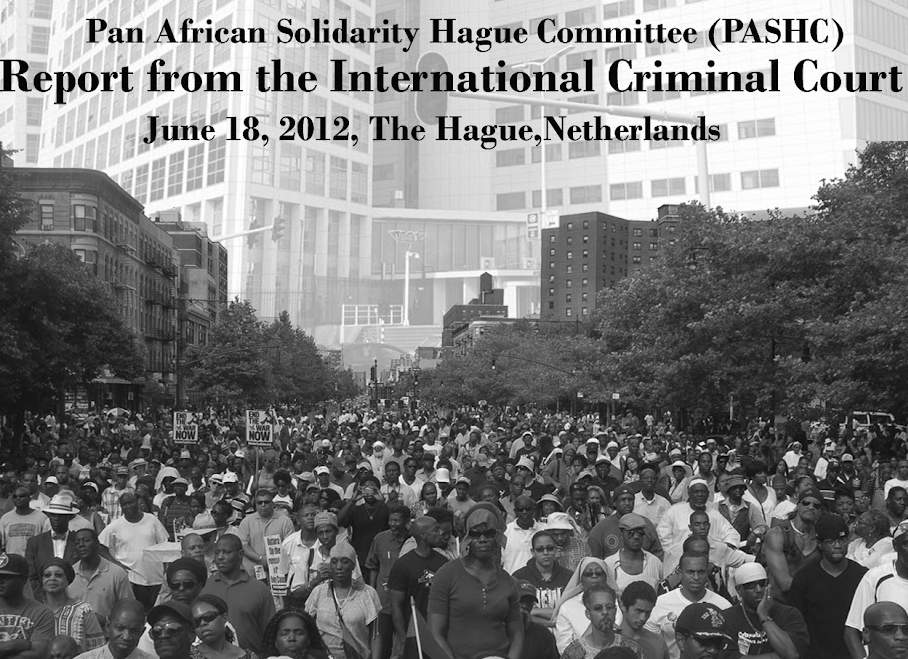
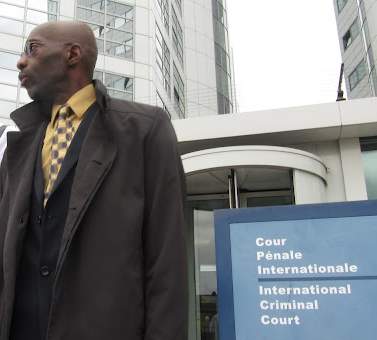
Pan African Solidarity Hague Committee Serves The ICC
In June of this year, the Pan-African Solidarity Hague Committee delivered a petition to the International Criminal Court at the Hague, Netherlands demanding they prosecute the United States, Great Britain, France, Italy, Canada, and NATO for war crimes and crimes against humanity in Libya, Cote d’lvoire, Haiti and the US. This campaign began in May of last year when thousands gathered to protest the US/NATO bombing of Libya, attacks on Zimbabwe and the racist assault against African-Americans in the United States. The evidence presented made a prima facie case of crimes committed and was the basis of the petition served this year.
Attorney Roger Wareham:
- The United States was very involved in the process of setting up the ICC.
- There are approximately 116 countries that have signed on at this point. Which means there are about one third of the countries in world who have not signed on.
- After 10 years the court came forward with its first conviction. It was a citizen of the Democratic Republic of Congo convicted of crimes against humanity.
- It’s record has been really a court to prosecute Africans.
- Of the cases that are in front of it now, all of them are Africans.
- It’s as if people who’ve violated human rights don’t exist outside the African continent.
- As one observer had said this is really an African criminal court and not an international criminal court.
- With the international criminal court, non governmental organizations can bring charges, bring communications saying we think there’s enough evidence to begin an investigation and prosecute.
- The ICC had taken out a warrant against Khaddafi saying he was a human rights violator, committed crimes against humanity, war crimes.
- In May 2011 when it was clear they were trying to effect regime change and assassinate Colonel Khadaffi we began a campaign to expose that. We saw the same pattern in terms of what happened to President Aristides in 2004.
- After the August 2011 rally we had the people’s tribunal in January 2012.
- In June 2012 we hand delivered the petition to the ICC. We asked to speak to the chief prosecutor. She declined to meet with us for some reason.
- They don’t want to deal with prosecuting anybody from the West.
- A communication was brought to the ICC for the war crimes from Operation Cast Lead. Two years later the ICC declined the petition. I think their technicality was Gaza wasn’t a state.
- There is a campaign by the West to re-colonize the African continent for its resources, to remove those heads of state that are obstacles Western re-penetration.
Guest – Attorney Roger Wareham, a member of the December 12th Movement, an organization of African people which organizes in the Black and Latino community around human rights violations, particularly police terror. Wareham is also the International Secretary-General of the International Association Against Torture (AICT), a non-governmental organization that has consultative status before the United Nations.
———————————————————————-

























